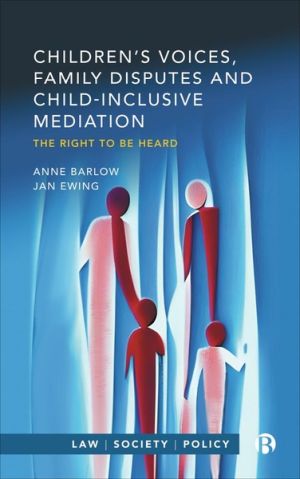
Recent legislative changes in England and Wales have eroded children’s ability to exercise their article 12 UNCRC rights to information, consultation and representation when parents separate. However, children’s voices may be heard through child-inclusive mediation (CIM).
Considered from a children’s rights perspective, this book provides a critical socio-legal account of CIM practice. It draws on in-depth interviews with relationship professionals, mediators, parents and children, to consider the experiences, risks and benefits of CIM. It investigates obstacles to greater uptake of CIM and its role in improving children’s wellbeing and agency.
Exploring the culture and practice changes necessary for a more routine application of CIM, the book demonstrates how reconceptualising CIM through a children’s rights framework could help to address barriers and improve outcomes for children.